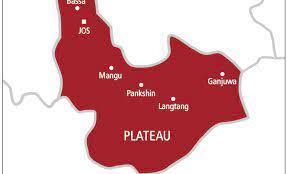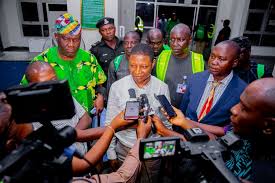Hajiya Saratu Shafi’i is the Director, Incorporated Trustees Department of the Corporate Affairs Commission (CAC). In this interview with IBRAHIM RAMALAN, Hajiya Shafi’i, who recently represented the Registrar General of the Commission during the flag-off of the maiden edition of the roundtable workshop organised for members of the Nigeria Network of NGOs, states that she derives joy in fulfilling a promise she made to the Network of NGOs to organize a sensitisation workshop for them 2 years ago.
Your Commission recently organised a maiden edition of a roundtable workshop for members of the Nigerian Network of NGOs. What is the significance of this workshop?
Well, it was a partnership with the Nigeria Network of NGOs to enlighten the various NGOs under that network to be able to get more acquainted with the laws governing their registrations, operations, as well as their compliance with our extant laws. Chiefly because, most people do have NGOs and they don’t often understand exactly what they are supposed to do and at what particular time they are to do it. By the time we discovered that, I think at one of their annual conferences, we then discovered and discussed the need to carry out a sensitization workshop for them to be more involved and aware of what it entails to run an NGO in tandem with the international community.
Furthermore, the workshop is unique in many ways. First it will closevup the knowledge gaps that exist and will inspire a new orientation in our compliance ratings. Secondly, it will provoke our consciousness as a people to reflection good societal cum corporate practices and thirdly, it will enhance sincerity of purpose in our commitment to brighten the country’s economic climate in accordance with global best practices.
You stated that the workshop came as a result of a realization by the commission that actually some NGOs are not operating in accordance with the international standard. Aside the workshop, is there any other ways of keeping these failing NGOs in check?
Yeah, already we have a number mechanism in place. We normally go for enforcement on a quarterly basis. And we have been emphasizing more on annual return fees, because it helps us with our revenue and also help them to be in check. But there are wider areas for enforcement, though for now we want to encourage them first of all to understand the need for the registration and then the need for them to comply in paying their annual returns fees before we begin to go deeper into how and where they get their funds and how they are spending it. A step at a time, they say.
This workshop is a maiden edition. Is it a one-of thing or it’s going to be organized annually?
God willing, if we are alive and healthy, we intent to make it an annual event, even if we can have it more than once, I think its a welcome idea. Also, we intent to organise it in various parts of the country, since we had our maiden edition in Lagos, south West, we intend to have it next in Kano, North West also. With time we may even hold it in, say Maiduguri where we have IDPs issues and the rest of other post war eventualities that so many NGOs are dealing with.
Though you earlier said the workshop was in collaboration with the Network of NGOs. How did you draw the participants, because it may not be possible to seat all the NGOs in one workshop?
Nigeria Network of NGOs has a huge number of NGOs under them. So it was not really hard, we had to even cut down on the number of NGOs they sent to us. A lot of people indicated their interest but we had a limited number of spaces for them. After every give and take, we arrived at 250 participants.
How would you rate the workshop in the area of result yielding?
Sincerely speaking, it is early to start gauging the impact. We know however that it has improved the way NGOs conduct themselves, pointer to which is the people’s responses through phone calls and other messages that we have been receiving. Hopefully also, by December we would be able to see annual returns payment increasing, registration fee too. I think just recently, the financial analysis report we have got from the Finance and Account Department of the Commission, there is a marked improvement in that regard.
Do you have any takeaways from the workshop?
I had the pleasure that we were able to conduct this sensitization within the Commission’s resources without asking or extorting from these NGOs a kobo. I am satisfied that we are not charging anybody one kobo on this conference. I have that pleasure that we have fulfilled one of our corporate responsibilities as a Commission. Because if you look at what happens in this part of the world, people tend to think that every opportunity is for them to make money. We in CAC are not like that. We are here to offer services to the public. The money people pay for registrations and other things are what we use to give these services back to the society. Everything doesn’t have to be about money. That is one of my major satisfactions. Even as we have challenges here and there, I kept telling my team not to worry. My satisfaction is also on the fact that I made a promise to the Network of NGOs and I was able to fulfill that promise.
Could you expand on the theme of the workshop: ‘Achieving Global Best Practices in NGOs Formation and Management?
Remember that the whole essence of setting up an NGO is to render a service and when such service is below expectation, especially in comparison with its counterparts elsewhere, that scenario is what we want to avoid. What we are saying is, if you do your job very well as an NGO, you stand the chance of accessing a myriad of international funds availably set aside for that purpose. For example, advanced countries do have foundations that have been running for thousands of years and are still running till today. What does that indicate? That they are running in tandem with the best practices. Therefore, through that workshop, we encouraged these NGOs to stick to the global best practices so that they could not only thrive within the country but also anywhere else.
There is insinuation that floating an NGO in this country comes with a lot of extortions that always stand in the way of registration in your Commission. What is the truth about it?
It is absolutely not. Let me tell you that there is a published guideline stating the procedures and the amount you need to pay at any stage of your registration. So where is the extortion, maybe from the middlemen (Lawyers) or other fraudsters? Because we have made it clear from the onset, in the Part C of the guidelines that you don’t have to go through a lawyer before you successfully register your NGO. You only need a guidance if you want to do it yourself, which we are always available to give.



